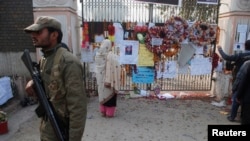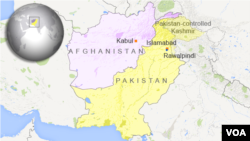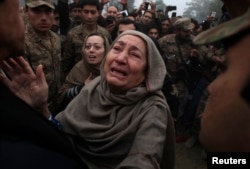When militants stormed a school in Pakistan’s northern city Peshawar one year ago and killed more than 130 children, the shock and outrage rallied the country against militancy.
Politicians who were previously in favor of talking with the Pakistani Taliban to make a peace deal backed out. The army intensified an operation in the lawless tribal region that was previously considered a safe haven for violent extremists of all kinds. The government announced a National Action Plan to deal with extremism and militancy.
Army spokesman Lt. Gen. Asim Bajwa said the operation had produced “phenomenal successes” in the last year and had broken “[t]errorist’ [sic] backbone.”
Bajwa also claimed that 3,400 terrorists had been killed and 837 hideouts destroyed – claims that cannot be independently verified.
Pakistan’s military is often blamed for harboring militant groups that attack its neighbors India or Afghanistan.
The United States has repeatedly called upon Pakistan to take action against the Haqqani network, one of the most violent groups among the Afghan Taliban and one that has been responsible for attacks against both the Afghan army and international forces.
However, a “major transformation” has taken place among the top brass of the military, political analyst Hasan Askari Rizvi said. The military has started viewing extremist groups as “a major threat to Pakistan.”
A pivot on militant groups?
Pakistan army chief Raheel Sharif has publicly said there are no longer good or bad Taliban, a distinction made in the past to distinguish between groups considered allies versus those considered enemies of the state.
Pakistan’s neighbors, however, are skeptical of the claims.
“You don’t need anything more than Google search to know that similar claims or similar hopes have been expressed many times in the past dating back to the Pervez Musharraf years,” said Praveen Swami, strategic affairs editor of the newspaper Indian Express.
In Afghanistan, most people go further.
“Maybe as far as the Taliban in Pakistan are concerned they might have changed their strategy,” Mohammad Ismael Qasimyar, in charge of foreign relations for Afghan High Peace Council said. "But as far as armed opponents in Afghanistan are concerned and insurgency in Afghanistan, it’s going on. We do not feel any change.”
'Limited influence'
Afghanistan accuses Pakistan of supporting the Afghan Taliban, particularly the Haqqani group. Pakistan has said some Taliban may be hiding in the country and Pakistan may have “limited influence” with them, but it does not control them.
Even the U.S. has issued a cautious critique of Pakistan’s actions against militant groups, with the U.S. Deputy Secretary of State Antony Blinken telling a group of journalists recently that while Pakistan was making a “critical” effort to combat terrorists in North Waziristan and has had “important success,” the U.S. would like it to do more against “outward-directed terrorism.”
“[W]e’ve expressed our deep concern to the government about terrorist safe havens inside its borders that have given violent extremists the ability to undermine Afghanistan’s stability and also target U.S. and coalition forces in Afghanistan,” Blinken said.
Political analyst Rizvi, however, believes Pakistan will take action against different groups in its own time and according to its own priorities “suited to Pakistani domestic context rather than to satisfy what Afghanistan wants, what India wants, and what the United States wants.”
Military stretched thin
One of the biggest reasons for not going after all groups at the same time, several analysts contend, is that the military is already stretched too thin.
It is dealing with ongoing operations in the northern tribal areas, tensions on both the Afghanistan and Indian borders, and an insurgency in the restive Balochistan province.
The other reason Rizvi explained, is that groups like the Lashkar-e-Taiba, an anti-India group blamed for the Mumbai attacks in 2008, or Jaish-e-Mohammad, another anti-India group blamed for an attack on the Indian parliament in 2001, and several others, are well entrenched in Pakistan’s urban centers and enjoy a level of support among the local population.
A military operation similar to that launched in tribal areas is not possible against them.
Different approaches
Many of these groups also run parallel charity organizations to garner public support as well as collect funds for their activities.
Under the National Action Plan, Pakistan’s government has placed a ban on news media coverage of the activities of such groups and has presented it as an example of Pakistan’s efforts to squeeze the public space for them.
Officials who spoke to VOA on conditions of anonymity said that agreements have been reached with certain stakeholders to reform the curricula of religious seminaries in Pakistan. However, the government is keeping this low key to avoid any backlash from religious elements in the country.
Skepticism still prevails on whether this is a long-term change in strategy or a short-term fix.
“There have … been various forms of bans on Lashkar-e-Taiba and its subsequent variants the Jamaat-ud-Dawa, the Falah-e-Insaniat Foundation ever since 2001. And those bans have been really weakened or fallen apart after a period of time,” said Indian Express editor Swami.
“I think till there is demonstrable action against networks like the Haqqani network, the Lashkar-e-Taiba, I think the predominant attitude on the Indian side is let's wait and watch and see what finally happens,” he added.
There are signs, though, that this time may be different from the past.
Lashkar-e-Taiba has not carried out an operation inside India since 2008.
“There’s been some evidence through interrogation of captured terrorists that even Indian jihadist networks like Indian mujahedeen have been placed under significant pressure to scale down their operations,” Swami said.
Infiltration
He also added that infiltration of militants from the Pakistani side has been in steady decline since 2001, when the two countries almost went to war.
There is a slow realization in Pakistan – at least partially, if not fully at this time, Rizvi explained – that militancy could no longer be used as an instrument of policy in the disputed Kashmir region.
Pakistan is also trying to broker dialogue between the Afghan government and Afghan Taliban, with the U.S. and China playing the role of guarantors. If the talks go through, they might eventually lead to a reduction in violence in Afghanistan and better relations between the two countries.
And recently India and Pakistan have restarted a dialogue process that had been stalled for a couple of years.
Rizvi said despite these developments skepticism will continue for a while on all sides, simply because of the lingering trust deficit between Pakistan and India and between Pakistan and Afghanistan after years of conflict and accusations.















